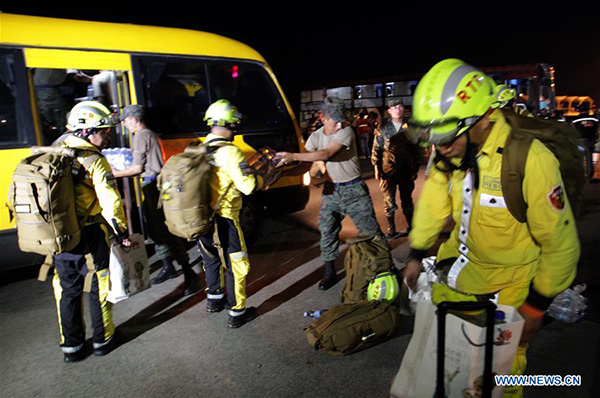Chinese enterprises come to rescue, relief after Ecuador earthquake
(Xinhua) Updated: 2016-04-21 17:28
 |
|
Members of China's rescue team arrive at the airport of Manta, Ecuador, on April 20, 2016. [Photo/Xinhua] |
Coordination in emergency response
On Sunday morning, a four-year-old girl in the port city of Manta was rescued after being buried for eight hours. She was close to death at that time.
However, all the nearby hospitals were either too badly damaged or overcrowded with seriously injured victims and unable to hospitalize her. The rescuers then turned to ECU 911 for help.
The nationwide integrated system for emergency responses, designed and built by China National Electronics Import and Export Corp, connects Ecuador's various security and disaster relief agencies from the police, fire department, transportation and paramedic units to the Red Cross, so as to facilitate emergency response. It has altogether handled over 20,000 cases in four days after the earthquake.
Once getting the phone call from rescuers, ECU 911 immediately designated a military helicopter to take the girl to Guayaquil for hospitalization, a decision that saved her from the almost certain death.
In the ECU 911 headquarters in Quito, over 20 Chinese engineers, along with their Ecuadorian colleagues, work day and night to ensure this life-saving system runs well.
"Our crisis center re-groups the help at all levels of the government to send food, rescue materials and other necessities ... we also coordinate the planes sent for relief mainly in Manabi Province," Francisco Rolayo, director of ECU 911's Quito center, told Xinhua.
By simply dialing 911, the 16 commanding and control posts of ECU 911 across the nation have played a key role in handling emergency situations.
Many Ecuadorians said that in their country, the Chinese enterprises are always reliable and ready to help them in natural disasters.
- Ecuador continues recovery efforts following powerful quake
- Anger erupts as 1,700 still missing in Ecuador quake
- Magnitude 6.2 quake strikes off coast of Ecuador - PTWC
- Ecuador counts over 400 quake deaths, damage in the billions
- China ready to provide disaster relief to Ecuador: FM spokesperson
- In devastated Ecuador, loss piles up amid rubble
- Shaken Ecuador hunts for survivors amid 7.8 quake debris
- Quake kills 262 along devastated Ecuador coast







